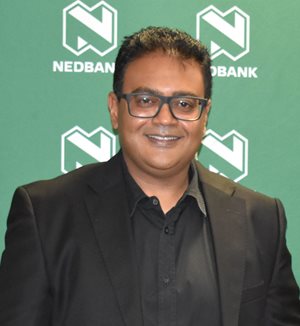
Poovi Pillay, executive head: Strategy & CSI, Nedbank
The green economy – a future-focused way of incorporating social protection and environmental stewardship into our model of economic growth – is a strategy that should dominate how the private sector does business. As a bank that aims to use our financial expertise to do good for individuals, families, business and society, our green economy vision to be a catalyst for sustainable economic growth in rural & semi-urban communities through replicable, innovative models with a focus on women, youth and people with disabilities.
In an era of climate crisis, geopolitical uncertainty, and technological disruption, companies are well placed to offer solutions to some of our most pressing challenges, and investing in the green economy is a way to reimagine the future of work and entrepreneurship – two key areas of development in South Africa.
It is a crucial strategy, not only because South Africa has the highest unemployment rate in the world, but because the deep inequality existing in rural and township areas is preventing communities from reaching their full potential.
Driving job creation and enterprise development
Nedbank revised its corporate social investment (CSI) strategy in 2021 to focus on four key areas of the green economy that are critical to both the economy and the wellbeing of communities: agriculture, water, energy, and waste.
The pandemic has shown us that water and food security are fragile, as is social cohesion. Communities need a hopeful solution that will allow them to become self-sustaining. For this reason, our CSI strategy responding appropriately to this requirement means constantly revisiting and adapting the CSI strategy and approach to align with the constantly shifting needs of people and communities. This makes Nedbank’s Group corporate social investment arm to identify the green economy as a sustainable and meaningful overarching theme. By linking our traditional CSI focus areas of education and skills development to four key elements of the green economy, we envisage a refreshed approach to job creation and enterprise development that will help to drive growth in communities in rural and semi-urban areas as well as ensure a resource-efficient, low-carbon future.
A good example of this is our partnership with the Buhle Farmers’ Academy, which addresses constraints that farmers experience and supports them with training, mentorship and start-up funding.
To date, Nedbank has provided almost R7m in support, enhancing farmers’ productivity and their involvement in the food value chain while increasing food security and boosting local communities. It has helped to support 10 emerging farming businesses, which has seen over 100 new jobs created in rural communities.
Projects like these contribute to the goals of the National Development Plan and the Sustainable Development Goals, which include achieving decent work and economic growth, zero hunger, clean water and sanitation, and affordable and clean energy, among others.
Through the Indalo Programme, the ultimate objective is to create sustainable enterprises that grow and lead to green job creation, which, in turn, contributes to economic growth over the long-term.
Contributing to strategic and direct support for green and inclusive enterprises within the water, energy, agriculture, and waste sectors is provided through different phases, namely: Innovation Proof (Indalovator), Growth Phase (Indalogrow) and Accelerator (Indaloaccel). Additionally, the programme focuses on strengthening the ecosystem of green enterprises through prototyping, testing and showcasing, financing, and support instruments.
As a concerned corporate citizen, Nedbank continues to seek out meaningful opportunities to contribute, synergistic partnerships and innovative solutions to enact a lasting change in the green economy for future generations and this partnership holds true meaning.
Exploring the green economy at the Trialogue Business in Society Conference
As a leader in sustainable business practice, Nedbank is proud to present the theme ‘Inclusive growth in the green economy’ at this year’s Trialogue Business in Society Conference. This inspiring annual conference, which addresses issues in development and responsible business, is the ideal platform from which to address key stumbling blocks and explore innovative solutions.
The theme will be presented on 10 May, with Nedbank’s group executive: marketing and corporate affairs, Khensani Nobanda, delivering the opening address. Trudi Makhanya, special economic advisor to President Cyril Ramaphosa, will give the keynote address on reconnecting with our natural environment, while a panel of experts will discuss how to accelerate enterprise development in the green economy.
As a company that believes in leveraging our financial expertise to do good for individuals, families, businesses and societies, we look forward to exploring this important topic and sharing why we believe that green is the new gold.
To find out more about the conference, and to register to attend, visit: https://trialogue.co.za/business-society-conference-2022/.
